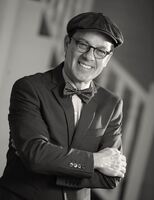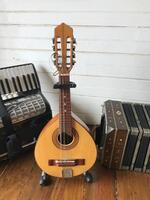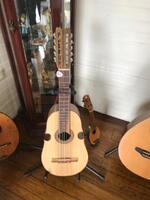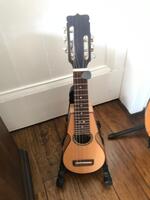Items
-
Santiago Escalera: Líder y Protector de Piñones
El Sr. Santiago Escalera Quiñones residente del sector Monte Grande del barrio Torrecilla Baja conocido mayormente como barrio Piñones de Loíza Pueblo. Es un líder comunitario que nos narra con precisión y nostalgia los diferentes eventos en los que se ha tenido que enfrentar esta población hasta el dia de hoy. En su lucha por el respeto y la igualdad de su gente busca mantener viva la importancia de no rendirse y no temerle a los grandes intereses. Su lucha por el derecho a la justicia de su comunidad, la preservación de Piñones, una región costera en Puerto Rico, es vital debido a su rica biodiversidad, manglares, humedales y playas que albergan numerosas especies. Para el Sr. Quiñones el proteger este ecosistema único, implica esfuerzos como la reforestación, la educación ambiental, la regulación del desarrollo urbano y la promoción del ecoturismo sostenible. Busca mantener el equilibrio ecológico, proteger hábitats naturales y garantizar que futuras generaciones disfruten de sus recursos. La entrevista fue realizada en el sector Villa Cañona por Melquisedec Carrasquillo Osorio y el apoyo técnico Ana Celys Allende del proyecto Loíza Vive. -
Confesor De Jesús y la Ceremonia Olvidada de Loíza
El Sr. Confesor De Jesús nacido y criado en el pueblo de Loíza y residente del barrio Medianía Baja sector Los Millonarios narra una de las costumbres de la época en el que se criaba, cuyo nombre se le llamaba baquiné. El propósito de la entrevista es reseñar y preservar la historia contada de primera mano vivida por el aportador. El baquiné era una tradición del pueblo de Loíza que consistía en una ceremonia mortuoria dedicada a la inocencia y pureza del niño fallecido. Era la manera de traer consuelo a la familia, dicho acto se acompañaba de cánticos religiosos y dramatizaciones que se convertía en la unión de todo el barrio cercano a la familia. La entrevista se llevó a cabo en el hogar del Sr. Confesor De Jesús quien amablemente cuenta su gran historia. Entrevistado por Melquisedec Carrasquillo y el apoyo técnico de Ana C. Allende del proyecto Loíza Vive. -
Dr. Stacey López Rivera
Coreógrafo, maestro de baile de salsa, experto en danzas. Posee un doctorado en Educación y Supervisión. Realizó estudios doctorales en movimiento en la Universidad de Columbia, New York. Obtuvo un Récord Guinness en el año 2000 por realizar una coreografía con 3,986 personas en España. Ha bailado para Tito Puente, Gilberto Santa Rosa, Ismael Miranda, Víctor Manuel, José Alberto "El Canario" y Tito Nieves. Reconocido y respetado a nivel mundial por su trayectoria profesional. -
Mandolina
Sed ut perspiciatis unde omnis iste natus error sit voluptatem accusantium doloremque laudantium, totam rem aperiam, eaque ipsa quae ab illo inventore veritatis et quasi architecto beatae vitae dicta sunt explicabo. Nemo enim ipsam voluptatem quia voluptas sit aspernatur aut odit aut fugit, sed quia consequuntur magni dolores eos qui ratione voluptatem sequi nesciunt. Neque porro quisquam est, qui dolorem ipsum quia dolor sit amet, consectetur, adipisci velit, sed quia non numquam eius modi tempora incidunt ut labore et dolore magnam aliquam quaerat voluptatem. -
Cuatro puertorriqueño
Sed ut perspiciatis unde omnis iste natus error sit voluptatem accusantium doloremque laudantium, totam rem aperiam, eaque ipsa quae ab illo inventore veritatis et quasi architecto beatae vitae dicta sunt explicabo. Nemo enim ipsam voluptatem quia voluptas sit aspernatur aut odit aut fugit, sed quia consequuntur magni dolores eos qui ratione voluptatem sequi nesciunt. Neque porro quisquam est, qui dolorem ipsum quia dolor sit amet, consectetur, adipisci velit, sed quia non numquam eius modi tempora incidunt ut labore et dolore magnam aliquam quaerat voluptatem. -
Tiple
Sed ut perspiciatis unde omnis iste natus error sit voluptatem accusantium doloremque laudantium, totam rem aperiam, eaque ipsa quae ab illo inventore veritatis et quasi architecto beatae vitae dicta sunt explicabo. Nemo enim ipsam voluptatem quia voluptas sit aspernatur aut odit aut fugit, sed quia consequuntur magni dolores eos qui ratione voluptatem sequi nesciunt. Neque porro quisquam est, qui dolorem ipsum quia dolor sit amet, consectetur, adipisci velit, sed quia non numquam eius modi tempora incidunt ut labore et dolore magnam aliquam quaerat voluptatem. -
José Mateo Rosario
I’m going to interview my dad, Jose M. Mateo. He is an attorney in the health industry, along with my mom, Dr. Olga Lliteras. She is a pediatrician for the hospital, Auxilio Mutuo, in San Juan. The main topic we will talk about, for the oral history project, is one of the major social injustices in the 21st century, which is the lack of health professionals and how they are undervalued in Puerto Rico as well as the lack of proper health care for patients because of political, economic and social circumstances. In Puerto Rico, we have so many other problems, but I wanted to learn more about this one because my parents are associated with the health industry. I would love to bring out their experiences to light for others to know what is going on nowadays. There is nothing more important than family and health. With this project I will emphasize what I believe to be true, while killing two birds with one stone. -
Janet Acevedo
Janet is a very dedicated woman, in all facets of her life as a worker, as a mother and especially as a daughter. Growing up in economic disparity she quickly learned the importance of family and perseverance. When Hurricane Maria came, and her parents’ financial situation turned dire, her and her siblings saw themselves carrying their financial needs and providing for them. But Janet, especially, saw herself carrying the burden of their health appointments. In this story she recounts her experiences dealing with a poor health care system and a very sick father in need of medical attention in the past two years. Along with her distaste of the governments handling of the island wide crisis. -
Wayner K. Ramón Ortega
Wayner Kalik Ramón Ortega is a trumpet player who left the island after acquiring his bachelor's degree at the Puerto Rico Conservatory of Music. On the island, the highest degree that can be obtained in the field of his interest is a bachelor's degree in orchestral trumpet performance, which he had already obtained. With no more opportunities for him in the world of classical music, Wayner makes the decision to leave the country to seek better opportunities in the United States. In recent years, many Puerto Ricans have left the island behind to seek a better lifestyle, since public services such as water, electricity, and public health have been in decline after the passage of Hurricane María in 2017, of the COVID-19 pandemic and the earthquakes that occurred in January 2020. In this interview we see a different point of view of why people leave the country. Wayner explains the lack of up-to-date resources in music education and the difficulties that arose in his life as a musician after finishing his studies. He compares studying and living in the United States and in Puerto Rico and expresses his feelings about leaving the island. -
Lucy Serrano Gastón (2021)
Lucy Serrano Gastón, founder and lead of the Come Colegial project, talks about her childhood and family life. She describes her deep connection with food as well as strong family bonds which have influenced the project that feeds and cares for the university community. We learn about Lucy's professional development and the people who have supported the experiences she describes in this interview. Ranging from grade school stories, Christmas traditions, university life, and present relationships, this interview largely focuses on human connections. Additional topics in the interview are related to current events in the context of Puerto Rico, including life during COVID, protests and massive power outages. -
Lucy Serrano Gastón (2022)
The interview focuses on Lucy Serrano Gastón, the advisor and coordinator of the organization named Come Colegial. During this interview, there were two foci. The first was on how did Come Colegial came to be. It focuses on what inspired its creation, for what purposes, and how it started building its way up into what it is known today. Therefore, there will be stories of organized activities, the support they received, and the people and organizations they collaborated with to make these activities happen. The second was on its expansion and evolution. This area focuses on how Come Colegial continued to work when faced with challenging situations and times, such as Hurricane Maria, the 2021 Earthquakes, and the Covid-19 Pandemic. Here, there will be descriptions of the measures that they had to take to provide their services successfully. In addition, there will be stories about some cases with students that impacted her and how they managed to help. -
Amanda S. Soto González
At the time of the interview Amanda Soto Gonzalez is a student at Universidad de Puerto Rico Mayaguez, and an activist who works in Alacena Feminista and Siempre Vivas. In this interview she explains how her degree in Biology and Microbiology help her view the social and political issues from a different context; explaining that the main goal of Alacena Feminista is to address needs of food security and food sovereignty. In her narrative she shares the events of summer 2020, Tropical Storm Isaias. What began as an act of solidarity to help the community becomes a larger organized permanent project, and Soto Gonzalez explains the logistics and planning that happens to sustain a mutual aid project like Alacena Feminista. Soto Gonzalez addresses the responsibilities of the government and how lack of funding, privatization of public services, rising poverty levels, climate crisis all contribute to lack of access in food and health for communities. While the focus of the project is food security, Soto Gonzalez describe intersectionality with other groups and activities to promote education through documentaries (Landfall) and other public events. The interview also describes educational methods, redistribution of resources, the Puerto Rico strikes of 2017 and 2019, Hurricane Maria, access to safe abortions and sexual education, the Covid-19 pandemic, and other events relevant to LGBTQ+ communities. Some organizations mentioned include, Siempre Vivas, Ache Top, Combahee River Collective, Matrilíneo, and Kilometro 0. -
Nicole Feliciano Díaz
This is an interview between Lionel and Nicole, two friends. Lionel interviewed Nicole, a 20-year-old mechanical engineering undergraduate student at the University of Puerto Rico, Mayagüez campus. She is originally from Adjuntas, Puerto Rico, located in the center of the island. Nicole is currently doing a co-op in an aerospace industry and hopes to work in the same industry in the future. Nicole is asked to describe Puerto Rican culture in one word, and she says "resilience", because it describes how Puerto Ricans have overcome difficulties and situations in recent years. The next question is about her childhood in Adjuntas, and she describes how she loved playing outside, running, and wrestling with her grandparents. She also talks about how her family loves cooking and eating together, and how they have a tradition of getting together every Sunday to prepare food and catch up with each other. She deepens on how that helped her through Hurricane María and after its impact. Throughout the interview, the Nicole states different aspects of Puerto Rican culture, such as the importance of family, the love of food, and the spirit of curiosity and exploration. Nicole shares a sense of pride in their culture and the resilience of their people. The interview provides a glimpse into the unique traditions and experiences of growing up in Puerto Rico. -
Celimar Adames
This interview is about the experiences Celimar Adames had during hurricanes Irma and María. This was a very difficult time for every Puerto Rican, all the devastation that these natural disasters caused left many citizens with nothing. Celimar’s work was all about going out into the cities and finding stories about these people who have no homes because of the floods, or no water to drink. She had to process all of this and then go and do her job without letting her feelings interfere. She expressed her feeling of desperation at times when she felt like she wasn’t doing enough for the people. When she was feeling like this, she reached out to help groups and joined them. She also expressed her worries about climate change and how that is affecting the intensity of the hurricanes. This interview is a point of view of the hurricane that is not acknowledged enough, and I believe that the space that Prof. Chansky created is the perfect place to expose it. -
Juan Antonio Vélez Feneque
Juan Vélez Feneque, also known as Tony, was born and raised in Rincón, Puerto Rico. He was an orphan and the youngest of all his siblings. During the mid-1900, Juan Velez decided to migrate to the United States as a way to help his mother make ends meet. Living in "The City That Never Sleeps" can come with its ups and downs. There were instances where Tony found himself lost while traveling on public transportation, as well as overcoming difficult obstacles, such as searching for a job at the age of sixteen while still learning English. Throughout this journey he experienced many social injustices such as racism and discrimination. As a minority, he had to witness countless gang fights that have impacted life in many ways. He used them as a learning experience as a way to achieve the American dream. -
Wilson Rodríguez Olmeda
The narrator's name is Wilson Rodriguez Olmeda, the grandfather of Fernando Hidalgo Rodriguez (interviewer). He was a teacher, policeman, owner of an auto parts shop, and worked in the construction business until he turned sixty five. He addresses the times when he was a kid, when he started working, and a small period of his married life. The discrimination towards people in different political campaigns is adressed during the couse of the interview. Wilson goes against the government that mostly helps the same people of their political campaign. Everybody is equal, we are all human and we are allowed to have the same rights and benefits. Listen to this interview to find out Wilson's point of view in the refugee crisis! -
Peter Torres Greer
Peter Torres was born to Cuban parents in Miami, Florida, and later moved to Puerto Rico with his family. He was educated in Catholic schools and eventually attended Loyola University in New Orleans. After graduating, he joined the National Guard and later pursued a career in mortgage banking. Peter's upbringing in Puerto Rico was filled with family traditions and delicious meals cooked by his grandmother. Going grocery shopping at a nearby agrocenter was an adventure, where live animals roamed freely and livestock were sold in the butcher's shop. Peter talks about his early childhood and, growing up in Puerto Rico. -
Doris A. Sánchez Colón
Doris Sánchez is a teacher who has encountered several circumstances throughout the course of her career. With the current state of her retirement plan, she will not have enough money to support herself, let alone her two children, once she retires. It is described how her many experiences throughout her life reflect the significance she focuses on the education of rural Puerto Ricans. -
Silvia Meléndez Benítez
This interview consists of important details regarding the losses Silvia Meléndez Benítez endured at her business, which were virtually everything, as a consequence of the effects of Hurricane Irma and Hurricane Maria back in September 2017. Silvia breaks down the federal funds assigned to local business owners affected by the hurricanes and why she was denied those funds. As a result, she had to take care of the expenses in a private manner, which cost her a lot more than she could afford. She further discusses the grave mistake the government made by not allocating those funds with proper justice, leaving people with great amount of debt, helplessness, and distrust. -
Sandra Urbina Rodriguez
In this interview with Sandra Urbina Rodriguez we discuss her experience in Huracan Maria as a 55 year old woman who lives alone and is affected by a number of health conditions and mobility disabilities. In addition, we discussed the poor management the government had for people with disabilities. -
Lydia Rivera González
The narrator is Lydia Rivera González, she has 68 years and has lived in diferent places and has a strong ties to her church. This interview addresses her childhood, aswell as her youth in her search for jobs and the safety for living and food, aswell as her difficulties during the hurricane and how she helped others afterward. Her life experiences fit on those people that needed to go out and be able to help others becasue of the slow help of the government. She and others, part of the organization Caritas, send food, water and coupons to help people regain somewhat, of what was ultimately lost. -
Osvaldo Ríos Fernández
In dark times in Puerto Rico a hopeful generation awakes in search for a better future in the next generations. In this interview Osvaldo talks about his point of view of Puerto Rico current political situation and how we are managing it. Since the 2019 protest he tells us many things are changing and that people are waking up from a eternal sleep and its time to make a change ourselves. -
Alfonso Vélez Iturrino and Carmen L. Candelario Lugo
In this interview Alfonso Velez and Carmen Candelario both talk about their difficult childhoods in Puerto Rico, creating their owns careers, and their rough experience with hurricane George. They talk about the aftermath of the hurricane and their experience with hurricane María. -
Noemí Cortés
This interview is about the life of a pharmacist and her experience during hurricane Maria. She is a mother and businesswoman that was forced to help others, including her parents. She was blessed and didn't suffer any consequences. As a professional in the health field, she was able to gather medicines and help others with commodities that were not available at the time. -
Gerardo Flores Colón
The interview follows Gerardo Flores Colón and his life growing up with 11 siblings. He was the first of his siblings to graduate from a university, and he describes the obstacles he had to overcome while getting his degree. He talks about how difficult it was for underprivileged youths to complete their degrees.






















